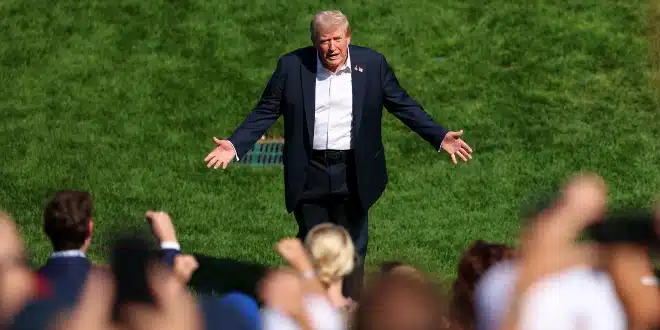President Donald Trump announced Monday on Truth Social that he intends to impose a 100% tariff on all movies produced outside the United States, a move that has left the film industry scrambling for clarity. While Trump provided no timeline or details on how such a tariff would be implemented, the statement marks the first time a U.S. president has openly threatened to apply tariffs on a service rather than a tangible product.
A Potential Blow to Hollywood’s Global Model
Trump first floated the idea back in May, arguing that foreign governments attract film productions with lucrative tax incentives, drawing business away from U.S. states. In his latest remarks, he singled out California as being “particularly hard hit” by this trend, despite the state offering its own rebate programs to encourage local production. Other U.S. cities and states have also rolled out incentives in recent years, but many major studios still choose to film abroad to cut costs.
Industry insiders say the impact could be devastating. “On first blush, it’s shocking and would represent a virtually complete halt of production,” one Hollywood executive told CNN when Trump previewed the idea earlier this year. Others stress the legal and logistical hurdles: the federal government has no clear framework to tax services in this way, raising doubts about enforceability.
Why Studios Film Abroad
While American actors and directors generally prefer to work close to home, economics often win out. Cheaper labor, government rebates, and lower production costs abroad frequently make filming overseas more attractive, even after factoring in travel and accommodation expenses. “It’s cheaper for Hollywood studios to pay for flights and hotels than to absorb higher costs at home,” explained Jay Sures, vice chairman of United Talent Agency.
Industry and Market Reaction
Trump’s announcement sparked immediate ripples on Wall Street. Netflix stock dipped 1% Monday morning, while AMC and Disney shares saw small gains, suggesting investors were weighing the potential disruption to streaming-heavy business models against possible benefits for domestic theaters.
The backdrop is already challenging for U.S. cinemas. Box office revenue peaked at nearly $12 billion in 2018, plummeted to just over $2 billion during the COVID-19 shutdowns in 2020, and has yet to recover fully. Annual ticket sales have not exceeded $9 billion since the pandemic, as streaming services continue to reshape viewing habits. Warner Bros. Discovery, CNN’s parent company, is one of the few bright spots, generating $4 billion in global box office revenue this year—the first studio to cross that milestone in 2025.
More Tariffs on the Horizon
The film industry isn’t the only sector in Trump’s crosshairs. Beginning Wednesday, his administration plans to roll out a new wave of tariffs, including:
- 100% tariff on branded pharmaceuticals (with some exemptions)
- 25% tariff on heavy trucks
- 50% tariff on kitchen cabinets and vanities
- 30% tariff on upholstered furniture
In a separate social media post, Trump hinted at a “substantial” tariff on all imported furniture, broadening the scope of his protectionist push.
What This Means Going Forward
If enacted, the movie tariff could dramatically reshape the global film landscape. Hollywood studios may be forced to reconsider filming locations, potentially cutting international partnerships and disrupting production schedules. Critics argue the measure could backfire, raising costs for U.S. studios, stifling creativity, and reducing global reach at a time when streaming platforms rely on international audiences.
For now, Trump’s declaration remains a threat rather than policy. But the very idea of taxing foreign-made films has rattled Hollywood, raising fears of an unprecedented intervention in the entertainment industry.


